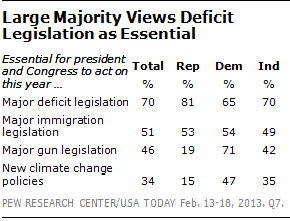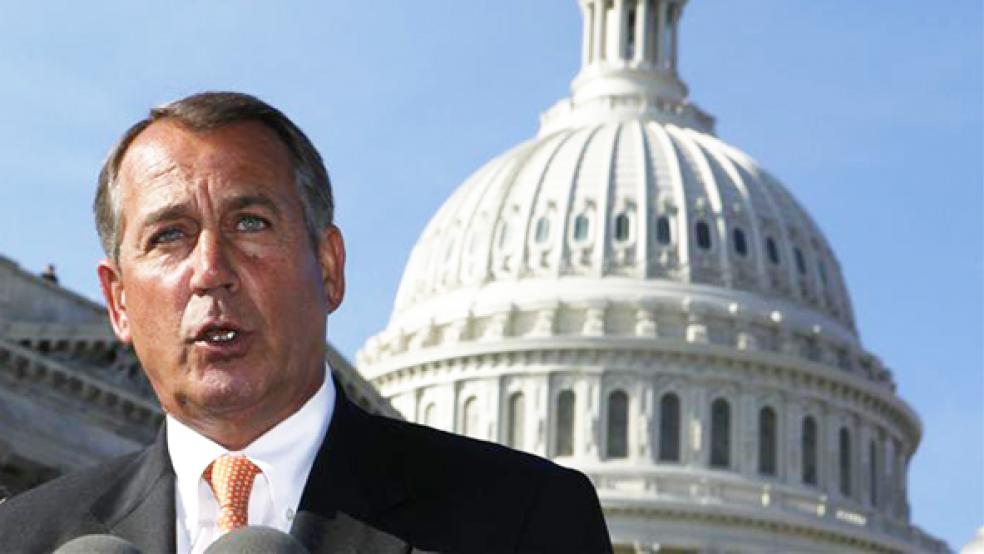GOP leaders have left little doubt the across-the-board spending cuts just beginning to take hold will be a fact of life for the government and some Americans for months, if not years, to come. But after weeks of deriding President Obama for exaggerating the effects of the cuts – from predictions of hundreds of thousands of layoffs and furloughs to a hollowed-out defense to cuts in Head Start and scientific research – House Speaker John Boehner was less confident about how the economy will fare as the random spending cuts begin to pinch.
“I don’t know whether it’s going to hurt the economy or not,” Boehner, R-Ohio, said in an interview on NBC’s “Meet the Press” on Sunday morning. “I don’t think anyone quite understands how the sequester is really going to work.” Boehner did acknowledge, however, that the president may have overstated his case:
“Well, if you look at the fact that they claimed all these air traffic controllers are going to be laid off and then it was found out they really didn't have to. And then when Secretary of Education went out and claimed that all these teachers in one county in West Virginia were being laid off as a result of the sequester, found out that wasn't quite true. And then they release thousands of detainees down in Arizona before the sequester even takes effect. There are a lot of questions about how the White House is handling the communications on this.”
Related: 5 Reasons Not to Worry about the Dreaded Sequester
Senate Republican Leader Mitch McConnell of Kentucky said on CNN, “I’m absolutely confident” the more than $1 trillion of long-term automatic cuts domestic and defense spending authorized by the 2011 Budget Control Act will be enacted – beginning with the $85 billion installment of cuts and savings now kicking in. “We think it’s important to the American people to keep this commitment.”
Mindful, however, the cuts could backfire down the road, McConnell and other GOP leaders say there’s still time to blunt the impact of the sequester by granting the Obama administration flexibility in choosing what to cut and what to spare. Yet Obama has made clear he doesn’t want to be stuck with making tough choices without Congress.
Senior White House economics adviser Gene Sperling dismissed the offer when he said on ABC’s This Week, “When you have those types of harsh spending cuts in such a short concentrated period of time, it's like saying to somebody you can cut off three of your fingers, but you can have the flexibility to choose which ones you want to cut off."
NOT SUPPOSED TO HAPPEN
As many on Capitol Hill like to remind, the sequester was never actually supposed to happen. It was suggested by the administration and added to the 2011 deal to raise the debt ceiling in order to push Congress to agree to more sensible and strategic cuts that achieved the same goal but without slashing Pentagon spending or vital domestic programs.
RELATED: Biggest Winners and Losers in Sequester Stalemate
Now, however, Republicans, who are making a virtue of the clumsy deficit reduction tool after concluding it would lock in more reduction without raising taxes. Based on a new poll by the Pew Research Center that showed that 70 percent of Americans want to see deficit reduction this year, the GOP may have guessed right. Still, jobs will be affected—especially among groups that have not yet been affected by the Great Recession. That potentially includes defense contractors, grants to educational institutions, and other outlays. Economists predict a possible 6 percent decline in GDP as a result of the sequester.

The House last year did pass bills to try to blunt the sequester’s impact on defense, shifting more savings to domestic programs while rejecting Obama’s call for closing tax loopholes for the rich and corporations. Boehner argued that Obama already got his tax cuts: “I made it clear to the president that again, a trillion dollars worth of tax hikes in Obamacare. And you have another $650 billion worth of tax hikes on January the first. You can't tax our way out of this problem,” he told David Gregory.
STUPID IS AS STUPID DOES
“This is not the smartest way to cut money,” Boehner said of the sequester. “A smarter way would be to move a bill that deals with our long-term spending problem. You can’t continue to spend money that you don’t have.” But where Congress and the White House are headed on budget and tax issues is anybody’s guess.
Boehner said the House would pass a spending plan this week to fund the government through the end of the fiscal year. The current stop-gap spending measure, or continuing resolution, is due to expire March 27 unless Congress and the White House intervene. The speaker said that in his conversation with Obama on Friday, the president agreed, “we should not have any talk of a government shutdown” – a point Obama seconded during his own news conference after the meeting. “I’m hopeful the House and Senate will be able to work through this,” Boehner said.
The House and Senate both intend to draft new budgets for fiscal 2014 and beyond by early spring, while the leaders of the Republican-controlled House Ways and Means Committee and the Democratic-dominated Senate Finance Committee are likely to press for a major tax code overhaul later this year if they can get bipartisan support.
The spending cuts that began to take effect midnight Friday come on top of $1.5 trillion in long- term reductions Obama and Congress agreed to as part of the 2011 debt ceiling deal. And nearly $700 billion more will come from tax increases on wealthy Americans that the GOP grudgingly agreed to as part of the deal to avert the fiscal cliff.
Another $700 billion could be saved by a long-term reduction in government interest costs. Taken together, those savings amount to nearly $4 trillion over the next decade, or roughly the deficit reduction target recommended by the Simpson-Bowles presidential fiscal commission and that Obama and Boehner sought as part of the talks they held in the spring and summer of 2011 before those talks collapsed.






